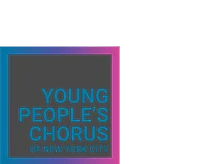[Daily News] Young People’s Chorus of Washington Heights gives uplifting voice to lofty ideals of founder Francisco J. Núñez
NEW YORK CITY
Young People’s Chorus of New York City
Their voices were everything you’d expect from a group of youngsters who hail from a place called the Heights.
The 60 members of the Young People’s Chorus of Washington Heights gave their uplifting debut performance in a packed Washington Heights Academy gym on Thursday, delighting their families and friends with glorious melodies and gorgeous harmonies. They sang in Latin, Spanish, English and even an old Australian dialect.
This group of uptown choristers, all between the ages of 7 and 11, constitutes the first of several community choruses to be created by the Young People’s Chorus of New York City, the 25-year-old non-profit brainchild of Francisco J. Núñez.
Created in 1988 with the mission of producing a diverse and musically distinctive program, YPC has grown into an award-winning, internationally-acclaimed chorus that serves more than 1,200 children across New York City and beyond.
Two years ago, Núñez became the first Dominican-American — and the first choral conductor — to win a prestigious MacArthur Fellowship.
He used his “genius grant” to establish the Núñez Initiative for the Advancement of Choral Music Education and — starting with Washington Heights — began working to create the first of several community choruses.
Students from such uptown schools as Washington Heights Academy, Amistad Dual Language School and St. Rose of Lima auditioned last November.
“Not only did they learn seven songs in different languages in two months, but they also learned how to behave on stage, learned to perform and look the part of amazing singers,” said conductor Johnny Rabe.
Since then, they have been rehearsing with conductor Johnny Rabe for an hour and a half each week.
“Not only did they learn seven songs in different languages in two months, but they also learned how to behave on stage, learned to perform and look the part of amazing singers,” said Rabe.
This is a testament to the quality of music education offered by Núñez and his team of professionally trained conductors, accompanists and music teachers.
“There is a feeling of everyone being close to you, like family, and not being judged; a safe haven,” said Bryanna Brown, who attends Dominican Academy in Manhattan and has been singing with the YPC for eight years. During that time, she says she has traveled with the chorus to Paris, Wales, London and Sweden.
Núñez, the program’s founder, always hoped to create such opportunities for Brown and thousands of other youngsters.
In recent years, he has also been driven to combat what he describes as a stigma that’s been attached to children’s choirs.
Hoping to re-invent the paradigm, Núñez created the “Transient Glory” series in 2001, commissioning complex pieces from renowned composers to be sung by his chorus.
“I was able to change the minds of major composers to write for children for the very first time,” he said.
Along with its core after-school program, YPC works with 10 partnering public schools in New York City; affiliates in Pennsylvania and New Jersey, and an international group, Uno a Uno, in the Dominican Republic.
“Music makes you reach you out to make better decisions in life – including going to college,” Núñez said. “That is my ultimate goal.”
Participating children are asked to pay an annual tuition of $225, but that covers less than 5% percent of YPC’s costs. The Young People’s Chorus is largely funded by supporting sponsors and foundation, corporate and government grants. The vast majority of children in the chorus and after-school programs are participating with the help of full or partial scholarship.
“Choral music can be life-changing, but it can’t be just about the music,” Núñez said. “We’re bringing young people together because they love to sing, but then they stay because it changes them.”
–Jheanel Walters
